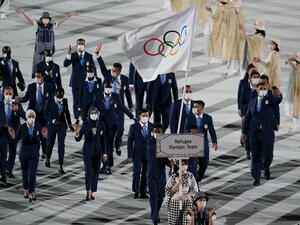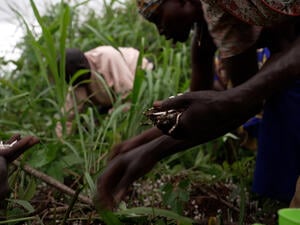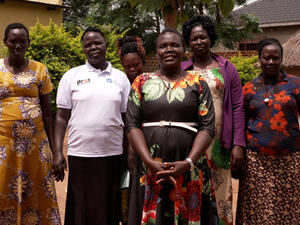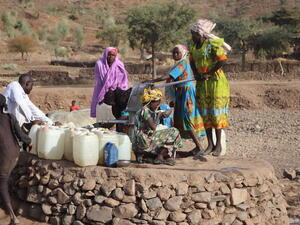Best of Rio2016: Top Olympic moments for Team Refugees

Best of Rio2016: Top Olympic moments for Team Refugees
Early one morning as he woke up in his room at the Olympic Village in Rio de Janeiro, South Sudanese runner Yiech Pur Biel answered a call from a number he did not recognize and a voice came on the line he had not heard for a dozen years.
"It was my mum,” says Biel, who was separated from his parents as he fled the war at home in 2005 and grew up alone as a refugee in Kenya. “I didn't know if she was alive or dead. She didn't know if I was alive or dead, in fact she thought I was gone. It was really something amazing, even today I can't believe it.”
Someone living near his hometown of Nasir in South Sudan had seen a Facebook post about him competing in the Refugee Olympic Team at the 2016 Summer Olympic Games in Rio de Janeiro. That person knew his mother, Nyagony Tut, a farmer, and took her to an aid agency's office where she made the call.
"It was my mum. I didn't know if she was alive or dead."
In one joyful, hour-long conversation, all the uncertainty he grew up with as a teenager and now a young man over whether his family survived was erased.
"She doesn't know what the Olympics are, but she understood that I had gone somewhere far away, and that I would come back, and I was okay," Biel says, with a huge grin. "All of this just makes me believe anything is possible, as long as you work hard and do good."
A specialist in the 800 metres, Biel is among five South Sudanese runners who made history competing in the 10-member Refugee Olympic Team at Rio 2016, for whom the experience proved life changing – often in unexpected ways.
Now back at their high-altitude training camp north of the Kenyan capital, Nairobi the runners have swapped smart bedrooms overlooking Atlantic beaches for single-storey grey-brick dormitories. Breakfast is once again milk straight from the cow instead of a lavish buffet.
Each of them is intensely proud of taking to the grandest global stage to represent the world's 21.3 million refugees, among a record 65.3 million people who are today forcibly displaced from home.
"When I stood at the start line," says Biel, "I felt the eyes of all the world's refugees on me. I wanted to show them that you don't have to be ashamed to call yourself a refugee, that we can be something else apart from people running from wars. It's only up to us to work to change that."
"When I stood at the start line. I felt the eyes of all the world's refugees on me."
Anjelina Nadai Lohalith, who ran the 1,500m, agrees. She says her time in Rio surrounded by people who dedicated their lives to reaching their goal has reinforced her own belief in the importance of having an ambition, and staying focused on achieving it.
"As a refugee, you can't just say you are displaced from your country so you can do nothing, and you depend only on what other people provide," says Lohalith, who fled her homeland aged six, and grew up without her parents in Kakuma Refugee Camp in the semi desert of northern Kenya.
"At least think of something that you can do extra for yourself. When you believe in yourself, that is what makes you powerful,” she adds.

Members of the Refugee Olympic Team meet UN Deputy High Commissioner for Refugees Kelly Clements in Rio's Olympic Village.
Each of the runners remembers a different highlight from the Games. For Biel, it was the call from his mother, followed closely by running a personal best time during his heat, and coming in ahead of other runners. For Lohalith, it was meeting and competing against the best athletes from around the world.
Both also said they enjoyed being tourists in Rio after their events were over.
"There were so many things that surprised me: the buildings were so tall that I was at first scared to go close to the window of my room and look down," Lohalith says, laughing.
"The food was very interesting. In the dining hall at the Olympic Village, all athletes from all around the world were there, and some things that people ate I cannot even tell you if it really was food, or what.
"The buildings were so tall that I was at first scared to go close to the window of my room and look down."
"I also found it amazing the way they cut the roads right through the middle of mountains. I had to make a video of these tunnels to show people, or they will not believe me."
Rose Nathike Lokonyen, who led the refugee team into the Olympic Stadium during the opening ceremony, was enchanted by seeing the ocean for the first time in her life. James Nyang Chiengjiek, the elder statesman of the refugee team at 28, and Paulo Amotun Lokoro, who ran in the 1,500m, both said highlights were the roar of support from the crowd during their races.
Each of the runners plans to continue their training, with support from the Tegla Loroupe Peace Foundation, and UNHCR, the UN Refugee Agency.
"You know this is just the beginning for us all," says Biel. "I tell my fellow refugees, in fact I say to anyone: to achieve great things takes time. There will be challenges. The key thing is, never lose hope."









